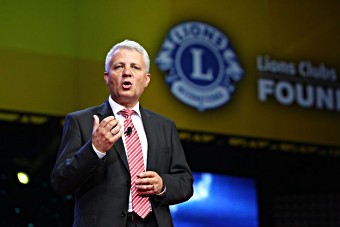
Dagfinn Høybråten
Board Chair of the GAVI Alliance

GAVI Alliance Board Chair Dagfinn Hoybraten addresses a crowd of more than 12,000 attendees at the plenary session of the Lions Clubs International Convention in Toronto, Canada. Credit: Lions Clubs/2014.
Prime Minister Stephen Harper made an important commitment on the world stage a few weeks ago to maternal, newborn and child health (MNCH). His was not an idle statement. Canada committed C$3.5 billion to the effort between 2015-2020.
Harper said something else notable during his address to the global summit on MNCH: “private sector organisations … will play a critical role in shaping and delivering on Canada’s top development priority.”
This caught my attention as a longtime government minister because government does not typically invite the private sector to deliver on government priorities and also because it aligns with some of the most innovative projects in global health, including one that I chair: the GAVI Alliance.
The GAVI Alliance provides vaccines to children in poor countries. It is a true alliance, including donors like Canada and the countries that receive vaccines, as well as organisations such as UNICEF, the World Health Organisation, World Bank, the Bill & Melinda Gates Foundation and the private sector.
This is a model that is working extraordinarily well. Since 2000, the GAVI Alliance has helped immunise more than 440 million children, saving 6 million lives. Even with this success, 22 million children still do not receive a full course of the most basic vaccines each year, leading to 1.5 million preventable deaths.
We all are stakeholders in this tragedy, including the private sector. Diseases such as pneumonia, measles and deadly diarrhea take an enormous toll in developing countries. Companies recognise that their competitiveness and the health of communities where they do business are mutually dependent. Global health means economic health.
Canada has been a strong partner of the GAVI Alliance, including as part of our Advance Market Commitment, an initiative that has worked with one type of private sector partner – the pharmaceutical industry – to bring developing countries an appropriate pneumococcal vaccine and thereby reduce the price by 95% for the poorest countries.
Another type of GAVI private sector partner is Lions Clubs International, which has brought 20,000 members to Toronto this week for its annual convention. The GAVI Alliance and Lions Clubs Foundation have created a remarkable partnership geared toward ending child deaths caused by measles.
Lions Club International Foundation is not only is raising US$30 million for GAVI – an amount being matched by the Gates Foundation and the UK government – but it also is deploying an army of 1.35 million volunteers globally to help us roll out the measles-rubella vaccine in 49 countries by 2020. Its cash contribution alone will help protect 60 million children from measles and rubella.
The GAVI Alliance recognises, alongside PM Harper, that government cannot do this alone. GAVI has actively worked with private sector partners like Lions Clubs to bring significant funding, expertise and visibility to our work, overcoming barriers that once seemed intractable. They are helping us tackle pressing operational challenges, such as improving the vaccine supply chain, stock management and health records as well as bringing significant advocacy and visibility to our work.
This fits in squarely with PM Harper’s commitment at the May global summit on MNCH, building on the Muskoka Initiative launched at the G8 meeting in 2010 to help save the lives of 1.3 million children and 64,000 mothers. In April, Canada took another step when Health Minister Rona Ambrose announced C$20 million in funding to GAVI to support our immunisation supply chain strategy. This will help us work with the private sector to increase the availability of vaccines, building human resource capacity and increasing the availability and use of data on vaccine stocks.
Building partnerships with the private sector to leverage innovation, financing, and expertise is among the critical steps to breaking the cycle of poverty and saving the lives of mothers and children in the developing world. That is why it is central to PM Harper’s call to action around maternal, newborn and child health. And that is why the Lions Clubs and others in the private sector have partnered with us.
The GAVI Alliance model is designed as a sustainable approach that puts countries on track to self-sufficiency. If the public and private sectors collectively seize the moment, we can accelerate progress toward a world where every child, everywhere, is fully immunised. And we all will be better for it.
